Related Research Articles

Industrial rock is an alternative rock genre that fuses industrial music and rock music. It initially originated in the 1970s, and drew influence from early experimental and industrial acts such as Cromagnon, Throbbing Gristle, Einstürzende Neubauten, and Chrome. Industrial rock became more prominent in the 1980s with the success of artists such as Killing Joke, Swans, and partially Skinny Puppy, and later spawned the offshoot genre known as industrial metal. The genre was made more accessible to mainstream audiences in the 1990s with the aid of acts such as Nine Inch Nails and Marilyn Manson, both of which have released platinum-selling records.
Reflection or reflexion may refer to:
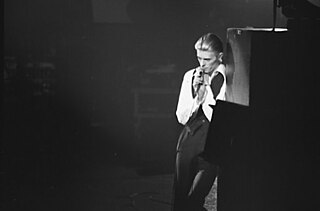
The Thin White Duke was the persona and character of the English musician David Bowie during 1975 and 1976. He is primarily identified with Bowie's 1976 album Station to Station and is mentioned by name in the title track, although Bowie had first begun to adopt the "Duke" persona during the preceding Young Americans tour and promotion in 1975. The persona's look and character are somewhat based on Thomas Jerome Newton, the eponymous humanoid alien played by Bowie in the 1976 film The Man Who Fell to Earth.
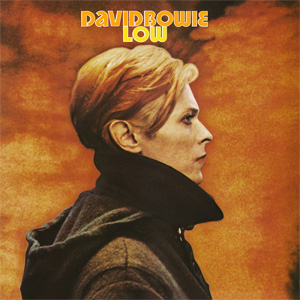
Low is the 11th studio album by English musician David Bowie, released on 14 January 1977 through RCA Records. After years of drug addiction when living in Los Angeles, Bowie moved to France in 1976 with his friend Iggy Pop to sober up. There, Bowie produced and co-wrote Pop's debut studio album, The Idiot, featuring sounds Bowie would explore on his next record. After completing The Idiot, Bowie began recording the first of three collaborations that became known as the Berlin Trilogy with American producer Tony Visconti and English musician Brian Eno. Sessions began at Hérouville's Château d'Hérouville in September 1976 and ended in October at Hansa Studios in West Berlin, where Bowie and Pop had relocated.
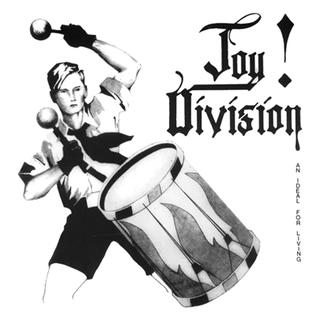
An Ideal for Living is the first EP by the English post-punk band Joy Division. It was released in 1978 by the band's own label, Enigma, shortly after the group changed its name from Warsaw.

Egregore is an occult concept representing a certain non-physical entity that arises from the collective thoughts of a distinct group of people. Historically, the concept referred to angelic beings, or watchers, and the specific rituals and practices associated with them, namely within Enochian traditions.
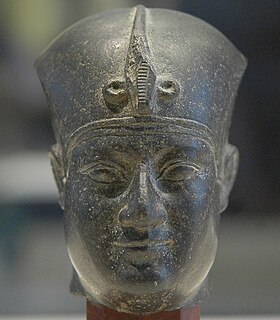
Nectanebo I was an ancient Egyptian pharaoh, founder of the last native dynasty of Egypt, the 30th.
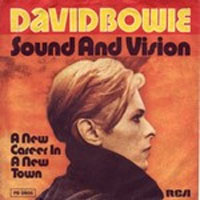
"Sound and Vision" is a song by English musician David Bowie. It was released in January 1977 by RCA Records on side one of his 11th studio album Low. RCA later chose it as the first single from the album. Co-produced by Bowie and Tony Visconti, the song was recorded at the Château d'Hérouville in Hérouville, France, in September 1976, and completed at Hansa Studios in West Berlin in October and November. The song began as a simple G major chord progression that Bowie gave to the backing musicians, writing and recording his vocals afterward. It features backing vocals from Brian Eno and Visconti's then-wife Mary Hopkin.

"Breaking Glass" is a song by the English singer-songwriter David Bowie. It was co-written by Bowie, bassist George Murray and drummer Dennis Davis in September 1976. Originally a track on Bowie's 1977 album Low, a reworked version of the song was a regular on the Isolar II Tour. A live version from that tour was used as the lead track on a 7" EP to promote his second live album, Stage in 1978. The EP reached number 54 on the UK Singles Chart in December 1978.

The Berlin Trilogy consists of three consecutively released studio albums by English musician David Bowie: Low, "Heroes" and Lodger (1979). The trilogy originated following Bowie's move from Los Angeles, California, to Europe to rid himself of worsening drug addiction. Influences included krautrock, the German music genre, and the recent ambient releases of English musician Brian Eno. After cancelling a proposed soundtrack album for The Man Who Fell to Earth, Bowie embarked on the Isolar tour and then moved to Europe. Before work began on the trilogy, Bowie co-wrote and produced Iggy Pop's debut solo album The Idiot, which features a sound similar to what Bowie would explore in the trilogy. He also collaborated with Pop for his second solo album Lust for Life before recording "Heroes". Both albums were released in 1977.
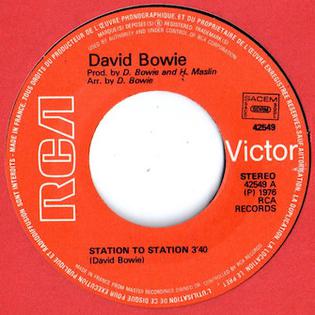
"Station to Station" is a song by English musician David Bowie. It was released in January 1976 as the title track and opener of his tenth studio album Station to Station, as well as on a promotional 7-inch single in France the same month. Co-produced by Bowie and Harry Maslin, it was written and recorded at Cherokee Studios in Los Angeles between September and November 1975. At over 10 minutes in length, it is Bowie's longest studio recording. Opening with a train-like noise, the song's first half is a slow march, built around an atonal guitar riff, while the second half takes the form of a prog-disco suite in a different key and tempo than the first. It has been characterised as art rock and is influenced by the German electronic bands Kraftwerk and Tangerine Dream.

"Speed of Life" is the first instrumental by David Bowie. It is the opening track for his album Low from 1977.
"Always Crashing in the Same Car" is a song by David Bowie from his album Low from 1977.
"Weeping Wall" is an instrumental piece by David Bowie from his album Low, released in 1977.
Vodou drumming and associated ceremonies are folk ritual faith system of henotheistic religion of Haitian Vodou originated and inextricable part of Haitian culture.

White Stains is a poetic work, its title based on onanism, written by English author and occultist Aleister Crowley under the pseudonym "George Archibald Bishop". It was published in 1898 in Amsterdam, Netherlands.
Ulrich Wilcken was a German historian and papyrologist who was a native of Stettin.

Vasalemma is a small borough in Harju County, northwestern Estonia. As of 2011 Census, the settlement's population was 879, of which the Estonians were 711 (80.9%).

Susanna Mary Clarke is an English author known for her debut novel Jonathan Strange & Mr Norrell (2004), a Hugo Award-winning alternative history. Clarke began Jonathan Strange in 1993 and worked on it during her spare time. For the next decade, she published short stories from the Strange universe, but it was not until 2003 that Bloomsbury bought her manuscript and began work on its publication. The novel became a best-seller.

Carl Heinrich "Charles Henry" Wilcken was a German-American artilleryman who was awarded the Iron Cross by the King of Prussia, Frederick William IV.
References
- ↑ "Hugo Wilcken: Bloomsbury Publishing (US)". Bloomsbury.
- ↑ Shapiro, Anna (19 May 2001). "Very French. Very Japanese. Very postmodern..." The Guardian.
- ↑ "Hugo Wilcken Interview".